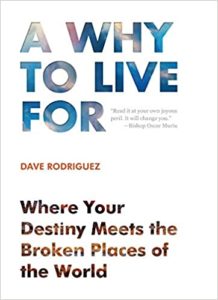Sometimes you see it coming. A dark storm on the horizon gathering intensity until it overwhelms you, rearranging life as you know it. Other times it hits you like a sledgehammer out of nowhere, knocking the sense and hope out of you.
Life crises come at us in various horrible ways, leaving us punch drunk and bewildered. There really is no way to avoid them. Life is unpredictable. Life is calamitous. And life can be downright tragic.
As you face your crisis, what you do next is of utmost importance.
Some people allow their crises to permanently define them. They become aggrieved and bitter, nursing a scarcity mindset. Others, unable to cope with the disorientation, seek to reinvent themselves by ending a marriage, moving across the country or abandoning a career.
There is a better way, a much better way to rebound from crises. Richard Rohr calls this better way “the further and fantastic journey.” David Brooks refers to it as “the second mountain…the mountain of destiny.” Crises do indeed force us into a season of bewilderment and they can be terribly painful, but crises can also be catalysts that reveal our “why” to live for and launch us into the most productive times of our lives.
Over the next few weeks I want to explore the four major life crises that we all face at some point in our lives. Four watershed moments that can make or break us depending on how we react to them, what we can learn from them and how we should leverage them for our greatest contribution to the world.
They are pain, failure, transition and disillusionment.
Pain needs little explanation. It might arise out of a physical illness or a devastating loss. It could present as the anguish of a mental or emotional disability. Pain might be the ache from a relationship gone south or the disappointment of a hope that was cruelly dashed. Pain can paralyze us. Pain can crush us. Pain can bewilder us.
But pain can also inaugurate the next journey of our lives.
Failure is the thing we’d rather not face and certainly not discuss. Failure is embarrassing. It is the product of willful stupid choices or accidental mistakes with unintended consequences. Failure happens to the evil and to the innocent. It can be humiliating and incapacitating.
But failure can be the turning point of our existence.
Transitions are inevitable. You leave home. You get married. You have a kid. You turn 30. Your kid heads to college. You turn 40. You lose a spouse. You turn 50. Your job is terminated. You turn 60. You retire. Transitions, like pain and failure are common to all of us. Transitions can be disorienting. Transitions can be disenchanting. Transitions can be disabling.
But transitions can be an open door to the wonder of a calling.
Disillusionment creeps up on us. It feels like a malaise, a low-grade emotional sickness in which we think and sometimes say out loud, “Is this all there is?” Life tastes bland. Stuff loses its value. The future no longer animates us. The present feels meh. Disillusionment generates quarter-life, mid-life and senior-life crises of meaning.
But disillusionment can also be the ashes out of which arises the phoenix of destiny.
I’m sorry if you are in the middle of a crisis, and maybe you’re not ready to hear this, but what you do next is crucial. It’s up to you. It’s your choice as to whether any of these crises can be redeemed.
f you are there, prepared to consider the road ahead and primed to climb the second mountain of destiny, pay attention to this newsletter or my blog over the next month or so. I have thoughts and suggestions about all of this and one big offer I’d like to make.
Your crisis does not have to define you. It can launch you!




0 Comments